Les conditions d'admission
Etre âgé(e) de moins de 30 ans (hors cas dérogatoires) pour bénéficier d’un contrat d’apprentissage et avoir validé :
- Une 5eme année de pharmacie ou école vétérinaire
- Ou un Master 1 avec bases en pharmacologie, mathématiques ou statistiques
Les étudiants de plus de 30 ans peuvent bénéficier d’un contrat de professionnalisation.
Les personnes en situation de handicap souhaitant suivre cette formation sont invitées à nous contacter directement afin d’étudier ensemble les modalités d’accès requises.
LES POURSUITES D’ETUDES POSSIBLE :
Pour les masters et ingé : études longues en université (en France ou à l’étranger) à partir du Master ou en écoles d’ingénieur.
Pour les bts / deust : Diplômé, vous pouvez intégrer directement le monde professionnel ou compléter votre formation par une licence professionnelle.
Accès à la formation :
- Réception des candidatures : les dates d’ouverture de dépôt des candidatures sont dépendantes de chaque formation. Se connecter sur le site de l’université pour connaître les dates. Dès que les dates sont fixées par les autorités universitaires, le CFA les présente sur son site et la candidature est déposée, soit sur Ecandidat, soit sur Apoflux, ou toute autre plateforme indiquée.
- Délais d’accès à la formation : Le début de chaque formation est différent. En moyenne le délai peut varier de 3 à 7 mois entre le dépôt de la candidature, les entretiens de sélection, la confirmation de la préadmission par les responsables pédagogiques, la signature du contrat d’apprentissage et le début de la formation. Il convient selon la formation souhaitée, de calculer le nombre de semaines entre le dépôt de la candidature et le démarrage de la formation tel que précisé sur le site internet.
- Processus d’admission : dossier de candidature et entretien.
- Signature d’un contrat d’apprentissage ou de professionnalisation avec un employeur.
Financement :
Dans le cadre d’un contrat d’apprentissage ou de professionnalisation, le coût de la formation est financé par l’agence France Compétences via l’OPCO de l’entreprise (dépendant de la convention collective appliquée). Aucun de frais de formation ou d’inscription ne sera à la charge du bénéficiaire du contrat d’apprentissage ou de professionnalisation.
Le CFA accompagne les entreprises pour la prise en charge du coût de la formation par l’OPCO. Selon les cas, dûment indiqués sur la fiche relative à la formation, un reste à charge peut être appliqué au-delà du montant financé par France Compétences.
Conditions particulières pour les établissements publics (contacter le ou la conseiller.ère indiqué.e)



